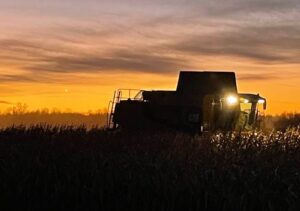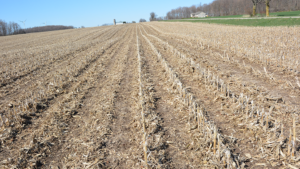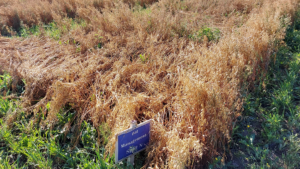Investing in oats
SUPPORT FOR AAFC BREEDING PROGRAMS

BRINGING A NEW seed variety to market is a long process — it can take 10 years or more of laboratory and field testing before a new variety is ready to be licensed and available for growers to plant. Plant breeders address growers’ wish lists for ideal varieties, including increasing yields, improving quality, improving disease and pest resistance, and mitigating environmental factors such as drought. Developing new and improved varieties not only takes a significant investment of time but also requires a financial investment to bring to market.
While private-enterprise breeding programs have become more common in recent years, Canada’s publicly-funded breeding programs play a significant role in developing and testing new field crop varieties. The investment in public breeding programs is especially important for small grains like barley or oats, which command a much smaller market share and are planted on fewer acres, attracting a smaller share of research and development investment dollars. To help sustain Canada’s publicly-funded plant breeding programs and to encourage renewed investment from the agricultural sector, Grain Farmers of Ontario, Agriculture and Agri-Food Canada (AAFC), and SeCan have recently signed an agreement to implement a new pilot project to administer a Variety Use Agreement (VUA) for the AAC Reid variety of oats. Developed by AAFC researcher Weikai Yan at the Ottawa Research Centre, this white-hulled spring oat is licensed and sold by SeCan and was bred to address issues including crown rust resistance, lodging, and earlier maturing dates.
WHAT IS A VUA?
A VUA is a relatively new mechanism in Canada for driving investment in plant breeding. When a grower chooses a variety covered by a VUA, they will sign a declaration acknowledging that they will pay an annual Variety Use Fee for any seed they harvest and plant the following year. Once registered on the VUA platform, the grower will be invoiced a fee each year they grow that variety.
“The VUA platform is set up to be an efficient way to collect an annual royalty on the seed and return it back to the breeder,” says Phil Bailey, eastern business lead for SeCan. He estimates that, in eastern Canada, approximately 75-80 per cent of oat and barley growers buy certified seed each growing season — and pay a royalty to support variety development — but those numbers are dropping as farms get larger and plant more acres.
The VUA system does not take away the grower’s right to save and plant their own seed. Instead, it helps to recoup the costs of the variety’s research and development, ensuring a stream of revenue to continue funding variety development. With a VUA, “… it’s not just the growers of certified seed, often the smaller farmer, paying for variety development,” Bailey says.
A FIRST IN CANADA
The VUA platform is developed and administered by Seeds Canada and collects royalties on select varieties of barley, soybean, wheat, and pulse crops. Royalty rates are set by the plant breeder and seed distributor and vary among varieties and locations sold. The AAC Reid VUA marks the first time that a VUA will be applied to a variety developed by Agriculture and Agri-Food Canada. SeCan will collect the funds from the VUA, and Grain Farmers of Ontario will manage the funds to support oat breeding projects by AAFC researchers.
“AAFC provides leadership in the growth and development of a competitive, innovative, and sustainable Canadian oat sector,” says Holly Mayer, director, Science Partnerships at AAFC. “AAFC is pleased to have the opportunity to pilot this particular mechanism for enhancing the sustainability of our eastern oat breeding program.”
“Innovation and research in plant breeding technology is a strategic priority for our organization,” says Paul Hoekstra, Grain Farmers of Ontario’s vice president, strategic development. “The AAC Reid VUA, developed in partnership with AAFC and SeCan, is one way that we can continue to invest in plant breeding initiatives that will directly benefit our farmer-members in the future.”
A PILOT PROJECT
“The AAC Reid VUA is a pilot project designed to allow our producer partners to get more money back into public plant breeding,” says Bailey.
A well-funded, robust public breeding program is essential to the industry’s ongoing success, says Quentin Martin, owner and co-CEO of Cribit Seeds.
“With respect to breeding oat varieties suitable for Ontario, for decades, the AAFC oat breeding program is the only reason oats are a viable crop in the province, full stop“, says Martin. “Generating a small amount of funds from all acres is critical to encouraging the continuation of public breeding programs.”
Martin says that the investment in research by Grain Farmers of Ontario and small companies like Cribit Seeds have helped sustain small private breeding programs, but that royalties from certified seed or a VUA can ensure they can flourish. •


























